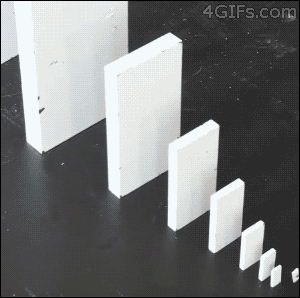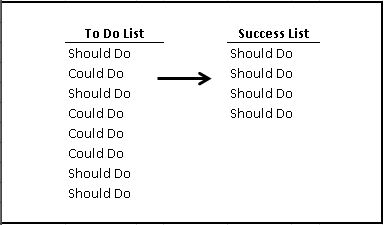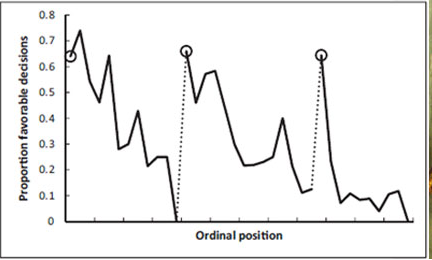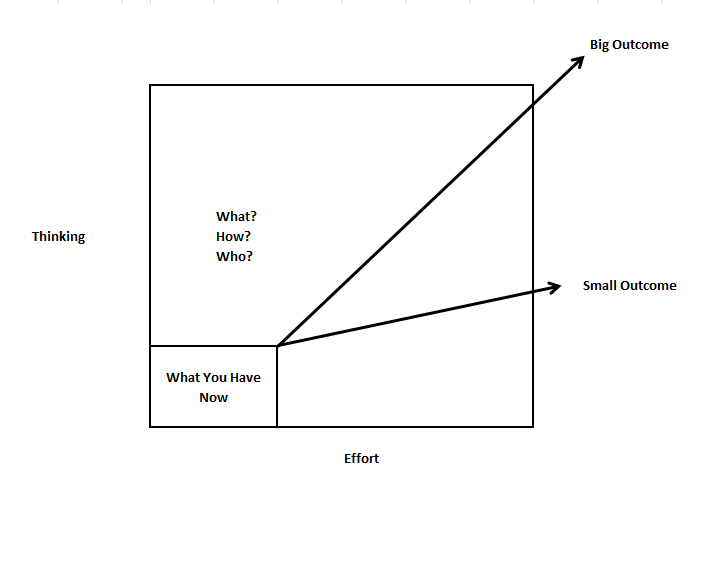The One Thing, by Gary Keller – My Notes, Part 1 of 2
My Take-Aways from The One Thing, by Gary Keller – Part 1 of 2
Definitions:
- Luck – getting what you want without any work
- Success – Getting what you want
Example: If you had all the $$$ in the world, to buy a home, there would be no choices – There are no homes worth that much
You must establish personal filters for knowing, doing, having.
If we want the best life – center of the triangle, we need to make the best choices
If you want extraordinary results in your life, you cannot be average.
Every day we run the risk of taking an “average” approach of choosing what we want and how to get it.
Example: If you work with a team that “thinks too much”, the process is slowed down – contingency plans, what if’s – it’s excess thinking and the job doesn’t get done
The only time you will have to compete, is to break free of “Averageness” – there is no competition at the elite level.
What is the reason performance varies when everyone works the same hours?
The people that work the extra hours have not connected what they do with what they want.
If you are going to eat an elephant, it does not matter where you start, as long as you start somewhere
Extraordinary success is sequenced, not simultaneous – as illustrated here:
Extraordinary successes are the:
- Skills acquired over time
- Successes that occur over time
You should always be thinking – always – “what is the next thing I can do to make a difference?”
Only worry about the future if the present is out of focus
Perform tasks in geometric progression. As you complete a task, you will get better at that item. You will then be able to complete other tasks, next in line
The Six Lies Between You and Success
1) Everything matters Equally – If you sit down and are supposed to be doing something important – what you feel is important – and you let something distract you – so much that you switched tasks – The task that you were working on originally was not of the greatest importance
Prioritize what you do
Do what is important first
You don’t have to be the best leader, best manager, best accomplisher… You just have to be the best at staying focused. Focus is the only thing that matters.
There is a common believe that whoever does the most, wins
- This strategy would never lead to success under any circumstance (example: Chess)
- Success is not measured by who does the most
- Don’t try to do everything..
- Everything does NOT matter equally.
- Only do what is important
DO NOT build a “To-Do List”, build a “Should-Do List”
Pareto principle (also known as the 80–20 rule, the law of the vital few, and the principle of factor sparsity) states that, for many events, roughly 80% of the effects come from 20% of the causes
Examples:
- Business: 80% of your sales come from 20% of your clients
- Economy: income growth accrues to those with the education and skills required to take advantage of new technology and globalization
- Technology: by fixing the top 20% of the most reported bugs, 80% of the errors and crashes would be eliminated
- Health and Safety: 20% of the hazards will account for 80% of the injuries
- Criminology – 80% of crimes are committed by 20% of criminals
20% of what you do creates 80% of your success
2) Multi-Tasking – If you are doing the most important thing at that point in time, and that IS the most important thing to do, then why would you do ANYTHING else at the same time?
The Jack of ONE Trade will always beat the Jack of ALL trades
Humans have ~4k thoughts every day. That’s 1 thought every 14 seconds
Humans cannot help themselves as their attention shifts
It is our responsibility to figure out how to change our nature
If you have this problem, go ahead and succeed anyway, in spite of this problem
Exercise – Take a piece of paper and write down 1 –>10, then A –> J horizontally,
Turn the paper over.
On the other side, complete the two horizontal sequences, simultaneously. Write the number from the top and the letter from the bottom, sequentially.
Which took longer? Focusing on one item at a time, or multi-tasking?
Example – If you are doing dishes and watching TV, dishes would be the primary task. What happens when a situation on TV catches your eye? We stop doing dishes
Fact: 28% of our day is spent trying to get our brains to re-focus
Poor decisions are made when new information is favored over the old, even if the old is more important.
Multi-tasking is life-reducing stress
3) A Disciplined Life – It takes 66 days to create a habit.
If you “feel weird” when you don’t do something, a habit is probably established
Example – an athletic person will report “feeling weird” if they eat bad food or miss their workout for the day. This person isn’t bragging. They are just used to eating a certain way and achieving a certain level of daily fitness. If one of these items in their routine is skipped, they tend to miss or even crave what was left out.
Success is actually a short race – a sprint fueled by discipline just long enough for a good habit to kick in and take over.
When you do the thing right, it can liberate you from having to monitor everything
Don’t be a disciplined person, be a person of powerful habits
Build one good habit at a time – success is sequential, not simultaneous
Give each habit enough time – stick with it long enough to become a routine
4) Will power is always on Will-Call
Will power is the WILL to say yes to what you need and the POWER to say no to everything else.
Will-power is simply an issue of timing. It’s when you use it, that it’s effective.
Willpower is like a car. If you get tempted to make a turn and go out of the way for something, you will run out of gas faster. Afterwards there is no more progression in any direction.
http://www.psychologytoday.com/blog/changepower/201210/marshmallows-willpower-and-reliability
A person really wants to delay gratification in situations, but willpower has a limited battery life as validated in this experiment:
The graph is dramatic. It shows that the odds that prisoners will be successfully paroled start off fairly high at around 65% and quickly plummet to nothing over a few hours (although, see footnote). After the judges have returned from their breaks, the odds abruptly climb back up to 65%, before resuming their downward slide. A prisoner’s fate could hinge upon the point in the day when their case is heard.
These rulings were made by eight Jewish-Israeli judges, with an average of 22 years of judging behind them. Their verdicts represented 40% of all parole requests in the country during the ten months. Every day, each judge considers between 14 and 35 cases, spending around 6 minutes on each decision. They take two food breaks that divide their day into three sessions. All of these details, from the decision to the times of the breaks, are duly recorded.
As you might expect, the judges were less likely to grant parole to prisoners who were earmarked as potential re-offenders, or to those who weren’t part of a specific rehabilitation programme. That’s rational enough, but the influence of the food breaks is less so! Danziger found that the three prisoners seen at the start of each “session” were more likely to be paroled than the three who are seen at the end. That’s true regardless of the length of their sentence, or whether they had been incarcerated before.
These results are tied to the repetitive toll of decision making
Willpower is a mental muscle that doesn’t bounce-back quickly.
If you employ it for a task there will be less power there for the next unless you refuel. When it runs out we revert to our “default” settings
When your most important work is done during the period of waning willpower, “default” will define your level of achievement….and Average will often be the result.
Will power is always highest in the morning. After much needed rest.
Make doing what matters the most a priority when your willpower is at its highest.
Don’t spread your willpower thin, monitor your fuel gauge and time your tasks
5) A Balanced Life
In an effort to attend to all things, some things will get short-changed. Nothing ever achieves perfect balance.
There is no such thing as a “balanced life”. It is an idea
In philosophy the “golden mean” is the moderate middle between polar extremes.
Purpose, meaning, significance are what make a successful life. Seek them and you will most certainly throw your life out of balance.
You will be criss-crossing over the invisible “balance line” as you pursue your priorities.
The magic in life never happens in the middle or on the average. Magic happens at the extremes
When you act on a priority, you will automatically throw things out of balance giving more time to one thing than another.
Example: This is like juggling glass balls. All will break if you stop juggling.. except work.. work is made of rubber and will always bounce back
To achieve extraordinary results, you must choose what matters the most and give it all the time it demands. This requires getting extremely out of balance in relation to other work issues.
6) Big is Bad
If you have visions of a small outcome, the decision you make will be small to get you to that outcome.
On the journey to achieve a big outcome, you will get bigger as you proceed.
If you mention big achievement, most peoples’ first thoughts are: Complicated, Hard, Time-Consuming, Difficult to get there, Overwhelming & Intimidating
This reinforces the “dis-ease” with the very idea of thinking big – call it “megaphobia”
When we connect big with bad, we trigger “shrinking thinking” – lowering your life trajectory feels safe. Staying where we are feel prudent
None of us know where our limits really are
Borders and boundaries are clear on a map, but they cannot be applied to life – no one knows their ultimate ceiling of achievement
Thinking big is essential to extraordinary results. Success requires action and action requires thought
The only actions that become springboards to succeeding big are those informed by big thinking to begin with.
Everyone has the same amount of time and hard work is simply hard work. AS a result what you do in the time you work determines what you achieve
What you build today will either empower or restrict you tomorrow – doing something one way doesn’t always lay the foundation for doing something better, nor does the relationship with one person set the stage for a more successful relationship with another.
Only living big will enable you to experience you true life and work potential







No comments yet.